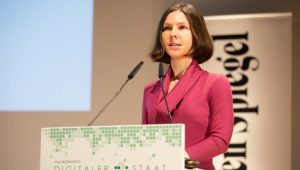Professor Alina Sorgner on Digital Technologies and Labor Markets
Rapid developments in the field of new digital technologies significantly affect the demand for workers who possess specific skills by changing their work content. These developments also create new forms of work, for instance, by enabling people to work remotely, by promoting collaboration in digital spaces, and by creating new opportunities for individual entrepreneurship and innovation activities.

Professor Alina Sorgner (photo courtesy of Digitaler Staat)
Professor Alina Sorgner, who teaches Applied Data Analytics at JCU, was invited to be a guest editor of the special issue on the “Impact of Technological Progress on Employment Prospects and Competence Development,” which was recently published in the international peer-reviewed open-access journal Foresight and STI Governance. This special issue is dedicated to the role skills and competencies play in coping with various challenges that labor markets face nowadays.
“This special issue of the journal aims at shedding more light on the different ways in which current technological progress affects the way we work while focusing on the role of skills. Moreover, it aims at better understanding the multi-dimensional nature of the impacts of the digital revolution by focusing at the level of individuals, organizations, and regions,” explained Professor Sorgner.
“We all have to deal with challenges that are driven by new digital technologies, such as artificial intelligence, machine learning algorithms, cloud computing, and dexterous robotics,” added Professor Sorgner. “Although the impact of technological change on labor markets is not a new phenomenon and it has been studied extensively over the past several decades, we do not know much about the effects of new digital technologies, which seem to outperform humans in many areas that have until recently been considered as ‘human terrain,’” said Professor Sorgner.
Read the articles in the special issue.
Watch the interview that Professor Sorgner gave (in Russian) to the Higher School of Economics, in which she explains the current trends on labor markets and the changing demand for skills.





